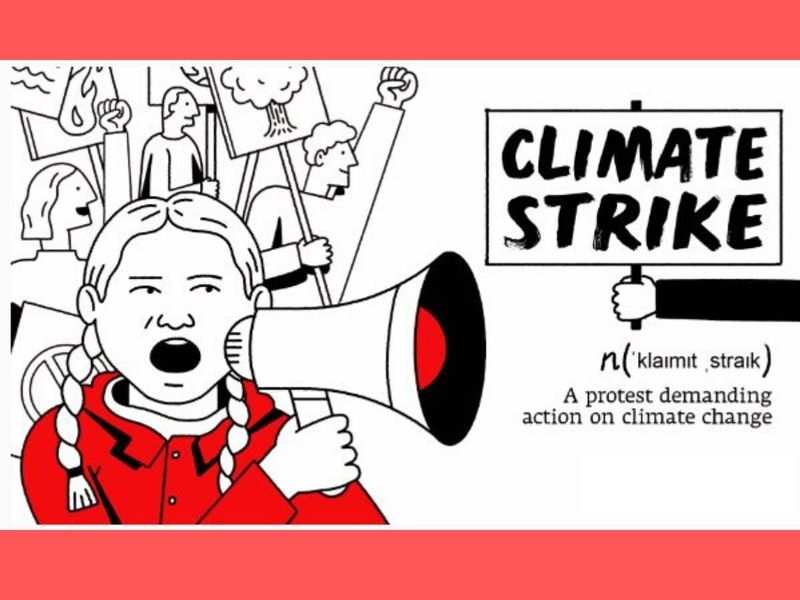(单词翻译:单击)
"Climate strike" was picked by Collins Dictionary after being used on average 100 times more this year than in 2018.
柯林斯词典将“climate strike(气候罢工)”选为2019年度词汇,今年该词的平均使用率是2018年的100倍。
The term was first recorded four years ago when pupils skipped school to protest over global warming - but the movement has grown over the last year.
这个说法最早出现在四年前,当时学生们罢课抗议全球变暖,但是去年,该运动影响范围进一步扩大。
Collins said it has also recognised the word "non-binary" as a specific term.
柯林斯词典表示,它还将“非二元性别”一词认定为特定的术语。
Lexicographers said it added non-binary in recognition of "changes in how people relate to each other and define themselves".
词典编纂者表示,增加“非二元性别”一词是为了承认“人们之间的关系以及定义自己的方式发生了变化”。
Non-binary people do not identify as either male or female and often prefer the pronouns they or them instead of he or she.
“非二元性别”的人既不认为自己是男性,也不认为自己是女性,他们通常更喜欢人称代词“他们”而不是“他”或“她”。
It comes after pop star Sam Smith said this year that they identified as non-binary, joining other celebrities including Me Too campaigner Rose McGowan and Queer Eye star Jonathan Van Ness.
在此之前,流行歌手萨姆·史密斯今年宣布放弃二元性别,“我也是”活动家罗斯·麦高恩和《粉雄救兵》明星乔纳森·范内斯等明星也宣布自己是非二元性别者。
Also added by Collins are the terms "double down", "influencer", "hopepunk" (a TV genre) and "deepfake ("a digital imaging technique").
柯林斯词典还增加了“double down”(拒绝让步)、“influencer”(网红)、“hopepunk”(希望朋克,一种电视类型)和“deepfake”(深度伪造,一种数字成像技术)等词汇。

'Double down' describes those who "refuse to give ground" rather than admit a mistake, while 'cancelled' is defined as "publicly ceasing to acknowledge a person, organisation, etc, esp on social media, in order to express disapproval of their activities or opinions".
Double down形容那些“拒绝让步”、不承认错误的人,cancelled被定义为“(尤指在社交媒体上)不再公开承认某人、某组织等,以表达对其行为或观点的不满。”
Alongside "climate strike", Collins has also added the term "rewilding", the practice of returning land to a wild state.
除了“气候罢工”,柯林斯还增加了“回归野生化”一词,即让土地回归野生状态。
The 2019 word of the year - which will get its own entry in the next edition of the dictionary - is defined by Collins as "a form of protest in which people absent themselves from education or work in order to join demonstrations demanding action to counter climate change".
2019年度词汇“气候罢工”将被收录进下一版的柯林斯词典中。柯林斯词典将其定义为“人们停课或停工,以参加示威要求采取行动应对气候变化的一种抗议形式。”
It is the second year in a row that an environmental term has been picked as word of the year, after "single-use" in 2018.
这是继2018年“一次性使用”之后,环保词汇连续第二年被选为年度词汇。
The term climate strike was first registered in November 2015 during the UN Climate Change Conference in Paris when the first event of its kind took place.
“气候罢工”一词最早出现在2015年11月巴黎联合国气候变化大会期间,当时发生了首次“气候罢工”。
But the movement was reignited thanks to Swedish teenage activist Greta Thunberg.
但由于瑞典青少年活动家格里塔·腾伯格的行动,气候罢工行动得以再现。
On 20 August 2018, Thunberg sat outside Sweden's parliament carrying a "school strike for climate change" sign and saying she was refusing to attend classes until Swedish politicians took action.
2018年8月20日,腾伯格坐在瑞典议会外,举着“为气候变化而罢课”的牌子,并表示除非瑞典政界人士采取行动,否则她将拒绝上课。
The movement snowballed with students around the world missing school to demand action on global warming, and in September millions of people took part in a global climate strike.
这场运动愈演愈烈,世界各地的学生纷纷罢课,要求对全球变暖采取行动。今年9月,数百万人参加了全球气候罢工。
BBC News first appeared to use the term on its website in February 2019, and used it again the following day when covering the wave of protests in the UK.
英国广播公司新闻频道于2019年2月首次在其网站上使用这个词,第二天在报道英国的抗议浪潮时再次使用。


